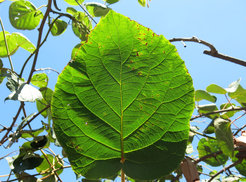Honour McCann
Plant Pathogen Evolution
Max Planck Institute for Biology
Faculty in: TIPP, IMPRS
Vita

- PhD, University of Toronto, 2006-13
- Postdoctoral training, Institute for Advanced Study at Massey University, New Zealand, 2013-18
- Lecturer, Massey University, New Zealand, 2018-19
- Max Planck Research Group leader at the MPI from 2020
Research Interest
Pathogen emergence
We explore the origins of infectious disease outbreaks in order to understand where novel pathogens come from and what processes underlie disease emergence events. The identification of nonagricultural reservoirs allows us to explore how pathogens evolve in the wild as opposed to cultivated environments, and identify specific genomic changes associated with adaptation to novel hosts or niches.
Within host evolution
Horizontal gene transfer and homologous recombination represent a source of selectable variation that contribute to rapid evolution in bacterial pathogens. Some mobile elements shuttle genes encoding virulence functions and resistance to antimicrobial compounds used in agricultural areas. We are interested in how mobile elements spread between pathogens infecting the same host and the consequences of coinfection on virulence outcomes.
Host microbe interactions
Bacterial pathogens frequently deploy specialised secretory systems to inject virulence proteins directly into plant cells. Plant hosts in turn have evolved proteins that can detect the activity of pathogen virulence proteins and mount rapid resistance responses. These interactions form the basis of host-pathogen coevolutionary arms races. We explore how these interactions evolve and their impact on host-microbe interactions in both non-agricultural and agricultural contexts.

Available PhD projects
- Currently not recruiting PhD students
Selected Reading
- McCann HC*, Li L*, Liu Y, Li D, Pan H, Zhong C, Rikkerink EHA, Templeton MD, Straub C, Colombi E, Rainey PB† and Huang H†. (2017). Origin and evolution of a pandemic lineage of the kiwifruit pathogen Pseudomonas syringae pv. actinidiae. Genome Biology and Evolution 9(4):932-944, doi: 10.1093/gbe/evx055 *co-first author, †co-senior author, *co- corresponding author.
- McCann HC, Rikkerink EHA, Bertels F, Fiers M, Lu A, Rees-George J, Andersen MT, Gleave AP, Haubold B, Wohlers MW, Guttman DS, Wang PW, Straub C, Vanneste JL, Rainey PB and Templeton MD. (2013) Genomic analysis of the kiwifruit pathogen Pseudomonas syringae pv. actinidiae provides insights into the origins of an emergent plant disease. PLOS Pathogens 9:e1003503.
- Colombi E, Straub C, Kunzel S, Templeton MD, McCann HC† and Rainey P.B.† (2017) Evolution of copper resistance in the kiwifruit pathogen Pseudomonas syringae pv. actinidiae through acquisition of integrative conjugative elements and plasmids. Environmental Microbiology 19(2):819-832, doi: 10.1111/1462-2920.13662 †co-senior author.

